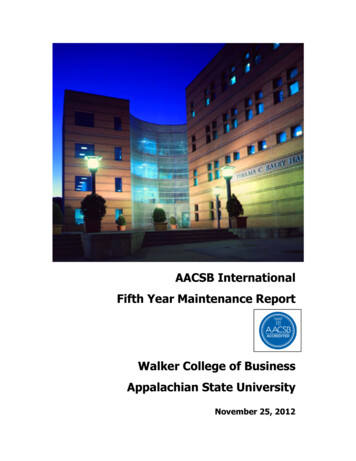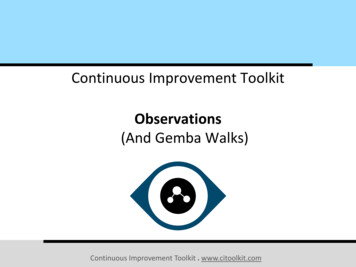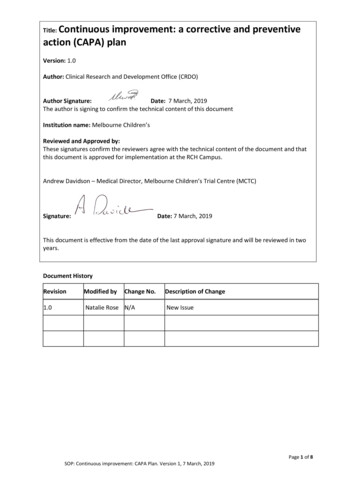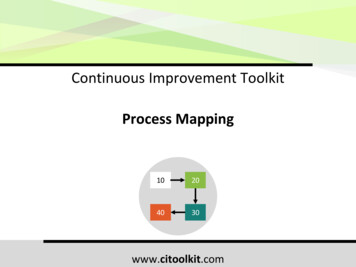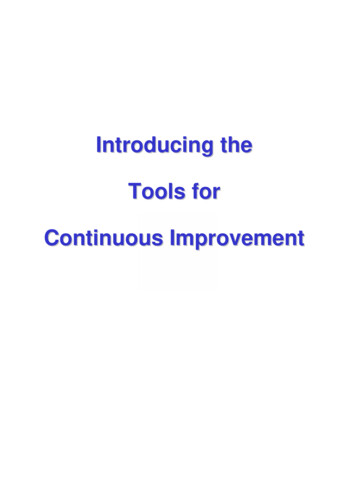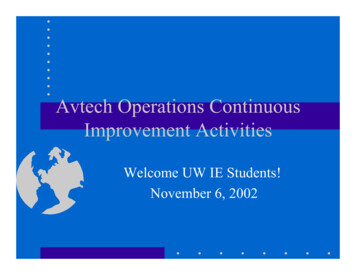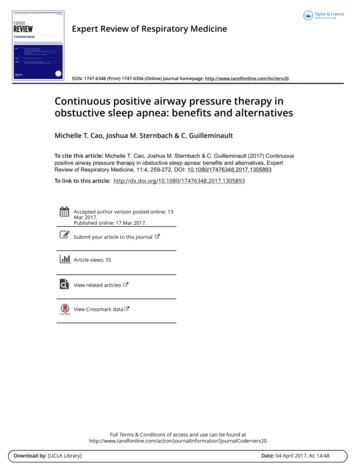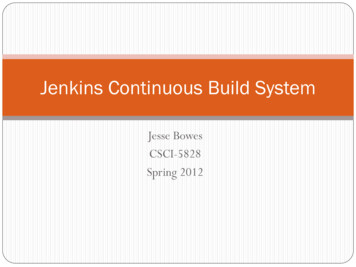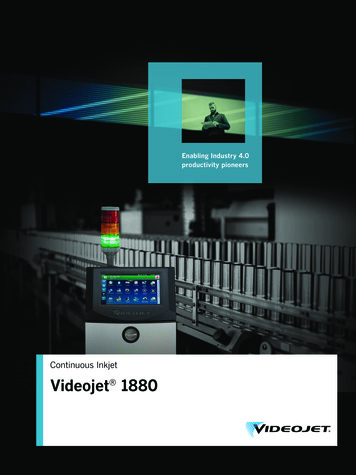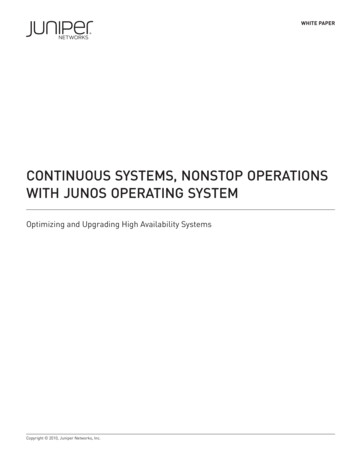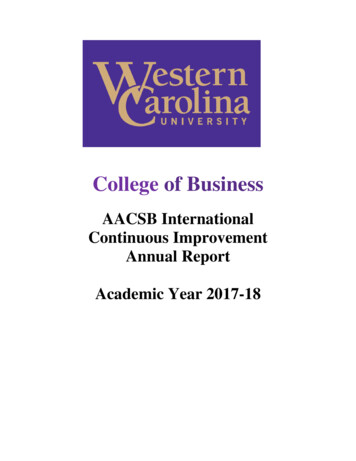
Transcription
College of BusinessAACSB InternationalContinuous ImprovementAnnual ReportAcademic Year 2017-18
The Year in Review: HighlightsWCU’s Master of Accountancy degree ranked intop five in North Carolina, behind Chapel Hill,NCSU, UNCW & Wake Forest. The Master’s inProject Management was re-accredited by PMI,which determined that the College’s programaligned with GAC Accreditation Standardsthrough the verification and clarification ofinformation provided in the self-assessment reportand on-site interviews. It received distinctioncommendations for 1) institutional/programstandards for hiring and retaining faculty, 2)contributions of the faculty and administrators tothe governance, intellectual, and social life of theCoB faculty meeting with SKEMA reps to discussprogram, institution, and professional community,curriculumand 3) the program learning outcome assessmentprocess. Further, GetEducated compared 31 master’s in project management from 29 regionallyaccredited online schools to create this ‘Best Buy’ list of the most affordable options in the UnitedStates and ranked WCU’s degree #1. It recently received a No. 4 national ranking from the websitemastersprogramsguide.com based on publicly available information about accreditation,accessibility, reputation and recognition, and each program’s career-advancing focus. A facultymember in PM, Vittal Anantatmula was awarded the prestigious Australian government’s EndeavorFellowship and will be visiting faculty at RMIT University in Melbourne, WCU’s long-term partnerinstitution in Australia.Other faculty were recognized this yearas well. Brian Clark was the keynote speaker forNorth Carolina Business Leadership Networkannual thought leadership luncheon. WendyCagle & Yue Hillon received the OutstandingAchievement in Teaching award at the ServiceLearning & Community Engagement Awardscelebration, and Bob Lahm won theOutstanding Achievement in Research award.Five faculty members from the College ofBusiness have been nominated by graduatestudents and/or colleagues for the Curtis W.Wood Excellence in Graduate MentoringAward: Yue Hillon, Leroy Kaufmann, Bob Interim Chancellor Morrison-Shetlar at 19th hole receptionwith faculty and alumniLahm, David Tyler and Steve Warren. YueHillon also received WCU’s prestigious Paul A. Reid Distinguished Service Award for Faculty.David’s Tyler’s co-authored paper, paper entitled "Prioritizing Sponsorship Resources in FormulaOne Racing: A Longitudinal Analysis” was named the 2017 "Paper of the Year in Sport Marketing"and honored at AMA Conference in San Francisco. Governor Roy Cooper appointed finance facultymember Ken Flynt to the North Carolina State Banking Commission as a Public Member.Students had many opportunities for experiential learning and to engage in co-curricularactivities. In September, the Insights and Reflections speaker series hosted Ronald Johnson (’76),President and CEO of Piedmont Pharmaceuticals. In April, the college hosted John Iamarino,Southern Conference Commissioner. Business students Jadie Aldridge, Rachel Kean, Patrick Killian
and Dalton Fishel made it into the top 25 in a national bank project competition. The CommunityBank Case Study Competition focused on management and board succession planning at localcommunity banks. The WCU team worked on a project with Entegra Bank in Franklin. The team’svideo of senior management goals and objectives was judged as the best among almost eightyschools in the country. Finance students outperformed both the Dow Jones industrial average andStandard & Poor’s 500 average, as well as 24 other college teams, to take first place in an investmentcompetition sponsored by the Tennessee Valley Authority. The TVA Investment Challenge provideshands-on experience in financial asset management, with student teams actively managing stockportfolios for the federal corporate agency, designing long-term investment strategies and selectinginvestments under the guidance of faculty members and within established guidelines. CIS seniorRachel Barenberg and Barbara Jo White, presented Adding User Experience (UX) Testing withStudents and Faculty Prior to Campus Website Updates at the national Student TechnologyConference for IT employees at universities. Eleven members of WCU’s Phi Beta Lambda, thecollege level of Future Business Leaders of America (FBLA), traveled to Greensboro, NC to the"Elevate your Future" conference. WCU members attained The Gold Star Chapter Award, whichrecognizes outstanding local chapters that have participated in PBL state membership activitiesestablished by the State Executive Council developed for the beginning of the academic year. WCU’sChapter of PBL also took First Place in the Western Region for Largest Chapter Delegation andSecond Place for Largest Chapter Delegation in the entire state.VISIONThe College of Business will be a leading educator of high-performance innovative leadershiptalent who are prepared to meet tomorrow’s business and the region’s evolving development needs.MISSIONWestern Carolina University’s College of Business is a leader among schools of business ingraduating baccalaureate and master’s degree students primarily from the lower Appalachians andthe Carolina Piedmont who are Business Ready to meet the needs of industries, markets, andinstitutions.STATEMENT OF VALUESIn pursuing our mission, the College of Business is committed to the following shared values: Integrity, Respect, Ethics, and Trust Intellectual Vitality: Passion for and Curiosity about Learning Engagement, Service, and Stewardship Globalization and Innovation Diversity, Inclusion, and Leadership Teaching, Learning, and Scholarship Excellence and Continuous ImprovementPHILOSOPHYIt is our philosophy that quality faculty who meet high standards in teaching, scholarly activities,and service are an absolute requirement in order to achieve this mission. In teaching, we adhere to the principles of the University’s QEP program with specialemphasis on the impact faculty have on the lives and professional career development of
their students. Graduates will achieve their high-performance and innovative leadershippotential through a curriculum emphasizing active learning, involving academic studiesenhanced by practical experience gained from engagement opportunities with businessesand economic and community development agencies in the region and beyond. In scholarly activities, we adhere to the Boyer model in defining those activities. There arefour categories of scholarship which include:o Scholarship of Discoveryo Scholarship of Integrationo Scholarship of Applicationo Scholarship of Teaching Besides the more traditional service venues, faculty service will include work done for thecollege in helping to establish or further strategic collaborations as well as engagement ineconomic and community development consistent with our mission.2015-16 Strategic Action Plan and Benchmarks of ProgressThe development of WCU’s 2020 Strategic Plan the-chancellor/wcu-2020-plan/ ) was a year-long process that engaged alarge group of individuals both on campus and off campus in 2011-12. Spearheading the university’sstrategic planning process was the 2020 Commission, a diverse and inclusive planning body that wascharged with developing a shared vision for Western Carolina University – Our Vision, Our Climb– within the context of the university's mission and budget, while reaffirming WCU’s commitmentto excellence, student success, and external focus and engagement.As a part of the process, the previous College of Business strategic plan was drafted in thecontext of the 2020 Strategic Plan. Input was solicited from all College of Business constituenciesin meetings and through a strategic planning website, which allowed participants to reflect on whatchanges should be made to the College’s 2008-13 plan to further the mission of the college and alignthe college with the strategic goals and directions of the university in its 2020 Plan. As a part of thisprocess, the terminology used in the College of Business plan was aligned with the terminologyemployed by the 2020 Plan. As proposed, the 2013-18 College of Business Strategic plan iscomprised of six strategic directions which are supported by goals and action items, and measuredannually by appropriate metrics.Prior to the beginning of each academic year, the Strategic Planning Committee (“SPC”)reviews the Strategic Plan with three purposes in mind. First, the SPC evaluates the progress thatthe College has achieved on each strategic direction. Second, if specific goals or strategies need tobe restated because they have already been achieved or the context under which they were developedhas changed, then the SPC recommends changes. Third, the SPC assesses the need for new actionitems to be added to the Strategic Plan. In addition, the SPC reviews the College’s vision and missionstatements.Prior to the beginning of the budgeting process, the SPC conducts internal and external scansto determine priorities related to the Strategic Plan. Consistent with the College of Business Bylaws,the Strategic Planning Committee presents its findings and priorities to the College Faculty forfeedback. After reviewing the SPC recommendations and faculty input the Dean sets the finalinstitutional strategic priorities and budget parameters for the planning cycle. The following tablesprovide a more detailed explanation of the progress and/or outcome achieved for the action itemsrelated to the college’s strategic goals and initiatives.COLLEGE OFBUSINESSSTRATEGIC PLANTIMELINEPlanning, Budgeting and AssessmentASSIGNEDASSESSMENTTO:FINANCIALSTRATEGIES
Strategic Direction 1: Enrollment Management (2020 SD1)Continuously improve the quality and diversity of our student body through controlled enrollmentgrowth that is consistent with the available resources for high quality program delivery that fulfills theneeds of our state and region.UG Enrollment 1735 .1&Graduate Enrollment 266 1.6%UG Degrees 528 12.3%Graduate Degrees 116 18.4%Goal 1 – Review and strengthen as needed the College’s admission, retention, and graduationrequirements for all students.Action Item 1 – Engagefaculty by discipline indiscussion aboutenrollment growth andplanningAction Item 2 – Engagefaculty in discussionabout quality and rigor incurricula2016-18DisciplineFaculty, Schooldirectors,GraduateprogramdirectorsSept 8th FacultyForum discussed: MBA update onthe exploration ofhybrid offerings; New Degree inEcon proposal New On-linedegree completionBSBA Finance. New On-linedegree completionBSBAManagement. Minor in DataAnalytics.N/A2016-18Faculty,Collegial ReviewCommittee,CurriculumCommitteeGPA per coursecirculated to faculty inMESH for discussionN/AGoal 2 – Improve the recruiting process with an emphasis on increasing the quality and diversity ofour student body.Action Item 1 - Launchand market Articulationon Demand WebsiteAction Item 2 – Organizeoutreach and recruitmentevents at CommunityColleges in thesurrounding NC countiesand outside of NC2017-18OngoingCoB AdvisingCenter,Directors,Associate Deanfor AcademicAffairsWebsite launched andintroduction sent to221 communitycollege personnel toannounce the conceptN/AFaculty andDirector ofAdvisingDirector of Advising& UG Affairs andDistance ProgramManager & Advisorattended consortiummeetings at StanleyCommunity Collegeand PiedmontCommunity College,as well as theNetworking Luncheonat SWCC; Outreachevents at SWCC’sState funds
Macon and JacksonCounty campuses.Goal 3 – Improve retention and graduation rates.Action Item 1 – Developprogramming to increasestudent familiarity withthe degree audit anddecrease percent ofstudents who do not clearfor graduationOngoingAdvisingDirector,Associate Dean,Faculty advisorsAction Item 2 –Monitorprogram performancemetricsOngoingFaculty, SchoolDirectorsAction Item 3 – Continueto update 8-semester plansheets and Articulation onDemand informationOngoingAdvisingDirector,Associate Dean,Faculty advisorsAction Item 4 – Develop8-semester plan sheets for2017-18AdvisingDirector,Transitioned part timedistance advisor tofull time DistanceProgram Manager &Advisor;Programmingimplemented includesclassroom visits tofirst and second yearstudents beforeAdvising Day tomodel academicplanning for theupcoming semesterbased on informationpresented in theDegree Audit andclassroom visitsgraduating seniors thefirst week of a newsemester to discussgraduation applicationand encourage them tocheck their DegreeAudit to confirm theywill clear forgraduation.Directors and Assoc.Dean for AcademicAffairs consistentlymonitored the numberof majors, theprojected rotations ofsections and the needsof the growingdistance programs8-semester plans areavailable atbusiness.wcu.edu andare updated annuallyto reflect the changesin our programs;Articulation onDemand documentsare also available atbusiness.wcu.edu andare updated annuallyto reflect any changes8-semester plans fordual BSBA degreesN/AN/AN/AN/A
double majors andmonitor degree efficiencymetricAssociate Dean,School Directorshave been createdpreviously(ACCT/FIN,MGT/BLAW,MGT/ENT, and SMwith all other BSBAprograms, and areupdated to reflectchanges in curriculumannuallyGoal 4 – Continuously improve the student body perspective on cultural enrichment, globalizationand sustainability.Action Item 1 – Continueto work with existingpartnerships and explorenew potentialOngoingAdvisingDirector, Faculty,School Directors,Associate Dean,Dean, IPSDirectorAction Item 2 –Contribute professionalactivities for Degree Pluscredit2017-19Faculty, Careerand ProfessionaldevelopmentHosted representativesfrom SKEMABusiness School inMarch to review andupdate curriculummapping; the BSHospital and TourismManagement facultyvoted to include aN/Aglobal learning goalfor their program;Director of Advisingvisited Chinesepartner and discussedpartnershipdevelopment,particularly with theHT program.Included 6 of 27 AoLstudent workshops onthe list of DegreePlusevents, with 150 students attendingAoL/DegreePlusevents; Financefaculty developed aProgram Manual forfinancial planningState and donorstudents that includes fundsan award forProfessionalDevelopment upon thecompletion of a seriesof experiences thathelp them developprofessional skills andbecome ready for theircareers
Goal 5 – Develop a professional Business Ready culture in the College of Business, which includesstrengthening ethical and professional behavior, developing and implementing co-curricular andexperiential learning programs and prompting career planning.Action Item 1 –ContinueJobzology software forcareer assessmentOngoingAction Item 2 – Provideforums for interactionamong student leaders,faculty & administrationOngoingAction Item 3 –Improveprocesses for internshipsupervision2017-18Director ofAdvising and UGAffairsKey classes employedthe systemLaunched CoBAmbassador program;Dean’s Office,Hosted lunch withAdvising Centerambassadors, deansand directors to solicitinformation exchangeCenter for Career andProfessionalDevelopment (CCPD)will implement arepository fordisciplines that do notgo through theirservices (Acct/SM);Center forMarketing will goCareer &through CCPDProfessionalbeginning 2017-18;Development,CCPD will flagCurriculuminternships that do notCommittee,align with Beststudent advisorsPractices and monitoreffective dates ofinternships; Directorsspot checkingBlackboard internshipclasses; Explorefeasibility of BApracticum courseproposal as a class.Planning, Budgeting and AssessmentState fundsN/AN/ACOLLEGE OFBUSINESSFINANCIALTIMELINE ASSIGNED TOASSESSMENTSTRATEGIC PLANSTRATEGIESStrategic Direction 2: Innovative CurriculumDevelop and deliver Business Ready career focused undergraduate business programs andstrategically-focused graduate business programs consistent with a changing global businessenvironment.Assurance of Learning Metrics Goal 1 – Maintain continuous curriculum assessment by the appropriate committees anddepartments.Action Item 1 – IntegrateBusiness Ready intoassessment activitiesOngoingAoL Committee,Faculty, Directorof AssessmentInvited to the“Interview withWCU’s BestAssessmentPractitioners” sessionat WCU AssessmentN/A
Action Item 2 – Sendfaculty to AACSBtraining seminarsOngoingAoL Committee,Faculty, Directorof AssessmentAction Item 3 – Collectfeedback fromconstituents regarding themeaning of the phrase"Business Ready "2017-18School directors,faculty,administrators2017-18School directors,faculty,administratorsAction Item 4 – Workwith College of Educationand Allied Professions onidentifying structure forhuman resources &workforce developmentdifferentiationand ImprovementSymposium 2018 inwhich persons wereimpressed by theCollege’s AoLorganizational site onBlackboard.Drs. Moss and Grubewent to the 2018InternationalConference andAnnual Meeting inHonolulu; DanClapper attendedAACSB DataAnalytics Summit inPhoenix; JimDeConinck attendedContinuousImprovement andImpact seminars.The faculty developedand then piloted asurvey on the meaningof Business Ready inthe spring of 2017 forfaculty; developedword cloud from thesurvey and put ondisplayMet with dean andfaculty and receivedreport on theprogram’s newdirectionsState fundsN/AN/AGoal 2 -- Ensure curriculum improvement and implementation as identified by the assessmentAction Item 1 – Monitorresults with GrammerlyOngoingAoL Committee,Faculty, Directorof AssessmentAction Item 2 – Continuesubscriptions to WallStreet Journal &BloombergOngoingDean’s OfficeAction Item 3- Maintaincommunication withOngoingAoL Committee,Faculty, Directorof AssessmentAoL committeedeveloped “GrammarRefresher” forimplementation in FallN/A2018 to identify anddocument studentknowledge ofgrammarSubscriptionscontinued; threeState fundsBloomberg facultyawards givenFall and springnewslettersState fundsdistributed; four
faculty through AoLnewsletter and workshopsAction Item 4 –Encourage QualityMatters trainingOngoingCoulter FacultyCommons,Facultyfaculty workshopshostedsix CoB facultyparticipated in the“Applying the QualityMatters Rubric”workshopState fundsGoal 3 – Update the curriculum based on a scan of the changing global environment.Action Item 1 – Providesupport and opportunitiesfor student study abroadin conjunction withProvost’s initiativesAction Item 2- Proposenew FYS in MGTAction Item 3- Completereview and revision ofMKT BSBA curriculumAction Item 4- Explorefeasibility ofinterdisciplinary dataanalytics minorAction Item 5- Explorefeasibility of developingdistance degree programsin MGT & FINAction Item 6- Beginreview process of MPMcurriculum after PMI/Global AccreditationCenter/s visitAction Item 7 – Exploredevelopment of a majorin Economics2013-18Dean, 2017-18Faculty GraduateCurriculumCommitteeOngoingCoulter FacultyCommons,Faculty16 CoB students wenton int’l exchanges and21 CoB students wenton faculty ledprogramsDeveloped BA 195,Movers & Shakers:Experienced Leadersand ExperientialLeadership, for fall2018 offeringFinal changesimplemented; coursesequencing improvedOffered course at theMBA and UG levelSummer 2017, Fall2017, Fall 2018Certificate program inthe financial planningconcentration inBSBA approved for atwo-year accreditationrenewal by theCertified FinancialPlanner Board ofStandards; Financecourses being offeredonline and requestdrafted; MGT minoronline.Initial explorationsregarding a doctoratedegree based on PMIrecommendationsInitial proposaldeveloped anddiscussed with variouscampus constituentsPlanning, Budgeting and AssessmentCOLLEGE OFBUSINESSTIMELINE ASSIGNED TOSTRATEGIC PLANStrategic Direction 3: External Engagement (2020 SD3)ASSESSMENTtravel supportfrom non-statefundsNANANANAN/AState fundsFINANCIALSTRATEGIES
Build and strengthen relationships that facilitate an exchange of knowledge with the businesscommunity, professional organizations
and Dalton Fishel made it into the top 25 in a national bank project competition. The Community Bank Case Study Competition focused on management and board succession planning at local community banks. The WCU team worked on
